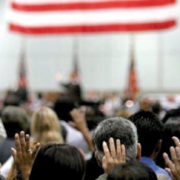After several legal battles, the Trump administration’s changes to the public charge rule
that could deny legal permanent residency status to certain immigrants if they are likely to require government assistance in the future took effect on Monday, February 24.
The public charge rule, originally published by the Department of Homeland Security in August 2019, expands the test immigration officials use on immigrants to determine whether or not government programs will become their sole source of financial, nutritional and shelter support.
Ken Cuccinelli, acting deputy secretary of the Department of Homeland Security, hailed the expansion as President Donald Trump delivering on his “promise to the American people to enforce our nation’s immigration laws.”
“This rule enforces longstanding law requiring aliens to be self-sufficient, reaffirming the American ideals of hard work, perseverance and determination. It also offers clarity and expectations to aliens considering a life in the United States and will help protect our public benefit programs,” Cuccinelli said in a statement.
The implementation comes a month after the conservative-leaning Supreme Court ruled in favor of the administration’s request to lift a lower court injunction that blocked the policy change from proceeding last October.
The new regulation does not affect those who already have green cards. However, if a legal immigrant uses one or more designated benefits for more than 12 months of a 36-month period, he or she may be deemed a “public charge,” which could threaten chances at getting a green card or lawful permanent resident status.
Under the test, U.S. Citizenship and Immigration Services (USCIS) officers will consider an applicant’s age, income, health and education, among other factors.
The changes now look at whether a person has used or is likely to use programs like most forms of Medicaid, Supplemental Nutrition Assistance Program (SNAP) and Section 8 housing vouchers and assistance.
The previous criteria only counted cash assistance, such as Temporary Assistance to Needy Families (TANF) or Supplemental Social Security Income (SSI), or institutional care paid for by Medicaid, as grounds for public charge.
The Department of Homeland Security won’t consider certain benefits, such as the national school lunch programs, the Children’s Health Insurance Program, subsidies for foster care and adoption, and Special Supplemental Nutrition Program for Women, Infants, and Children.
Some Medicaid benefits will be excluded, including those received by individuals under 21 years of age and pregnant women, those in connection with the Individuals with Disabilities Education Act, and treatment of an “emergency medical condition.”
With around 544,000 individuals who apply for green cards each year, 382,000 of them are in categories that would fall under the expanded test, the Associated Press said in a report.
More than 260,000 public comments were filed in response to the proposed rule, a majority of which were in opposition. Advocacy groups have sounded the alarm on the new regulation, arguing that it is another attempt by the current administration to limit legal immigration.
“We condemn these racist policies, which seek to dramatically undermine the family-based immigration system that has been the backbone of our country and instead prioritizes wealthy and white immigrants,” Asian Americans Advancing Justice, an affiliation of five civil rights organizations, said in a statement on Monday. “The public charge rule change continues the administration’s inhumane assault on immigrant families by increasing denials of green card applicants.”
About 17.8% of Asians and Pacific Islanders were said to have used government assistance programs in an average month, according to U.S. Census Bureau data released in 2015.
Geraldine Alcid, executive director of Filipino Advocates for Justice in Oakland, California, said that while the public charge expansion is “heartbreaking,” the organization will continue to fight for immigrant rights.
“While the public charge ruling is heartbreaking with lasting impact to our community, our spirits are not broken. In fact, we’re emboldened to continue to fight as we hold our vision for justice and equity and make our voices heard this November,” Alcid told the Asian Journal.
Non-cash benefits, such as Medicaid, SNAP, HUD public housing, and Section 8 housing, received before February 24, 2020 will not be considered in the public charge determination.
Exemptions to the public charge grounds of inadmissibility include refugees, asylees, certain T and U nonimmigrant visa applicants, and certain self-petitioners under the Violence Against Women Act, the USCIS said.
Immigrants applying for citizenship or naturalized citizens are not impacted by the changes as well. (Christina M. Oriel/AJPress)






